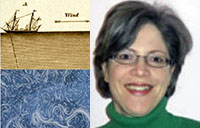
Professor Katharine Anderson, who teaches the history of science and technology, is the 2015 recipient of the Scripps Institution of Oceanography’s Ritter Memorial Fellowship.
This international research fellowship is awarded to historians and scientists whose scholarship expands understanding of the history of the earth, the ocean and atmospheric sciences.
“It was a complete surprise,” says Anderson, who will be using part of the $20,000 to visit Scripps at the University of California in San Diego, where she will give public lectures and further her research. “To have the opportunity to interact as a historian with the scientific community is really one of the privileges of the fellowship.”
The purpose of the fellowship “is to encourage the study of the history of marine science, a field that has received too little support in the past,” says Margaret Leinen, director of the Scripps Institution of Oceanography. “I am delighted that Professor Anderson has been selected as the 13th Ritter Fellow, and we look forward to her lectures during her visit to Scripps.”

For almost a decade, Anderson has researched ocean sciences during the 19th and 20th centuries. She studies hydrography, the science of mapping bodies of water, and past voyages used to map navigation routes across the world. This research includes the natural history, geology, scientific projects and ethnographic studies explorers engaged in on their journeys.
“But the project I think that interested Scripps is work on the ocean sciences during the inter-war period between World War I and World War II,” she says. “I am looking at the history of how people studied the oceans, how they created projects and networks of scientists’ international collaboration to do this work of understanding the oceans in a new way for a new, postwar world. What they thought was the end of a war-torn world was a new beginning.”
Explorers of the time were trying to find “new vistas” in the Pacific Ocean, which fits Scripps because the institute was built with its face to the Pacific in hope that America’s future would be California and the West, not the Atlantic and Europe, says Anderson.
The Ritter Memorial Fellowship was created in memory of William E. Ritter, the founder and first director of Scripps, and his wife, Mary Bennet Ritter.
Anderson is a faculty member in the Division of Humanities in the Faculty of Liberal Arts & Professional Studies.


